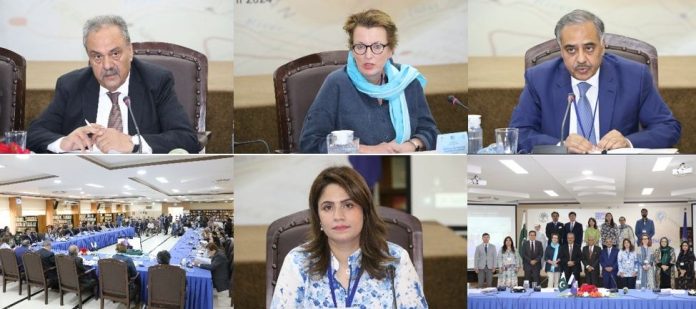ISLAMABAD, APR 24 /DNA/ – The Centre for Afghanistan, Middle East & Africa (CAMEA) at the Institute of Strategic Studies Islamabad (ISSI), in collaboration with the Friedrich-Ebert-Stiftung Pakistan Office, hosted a one-day International Conference, titled “Pakistan in the Emerging Geopolitical Landscape.” The Chief Guest at the Inaugural Session was Ambassador Asif Durrani, Pakistan’s Special Representative on Afghanistan.
Ms. Amina Khan Director CAMEA, in her introductory remarks, brought attention to the undergoing major transformations around the globe highlighting the need for increased global partnerships and equitable progress. Amidst these global shifts, the world, including Pakistan, stands at a critical juncture as regional dynamics, especially in West and Central Asia, impact Pakistan’s foreign policy and security, emphasizing the necessity to embrace international norms to navigate the complexities of the current global landscapes. While shedding light on the deliberations of the one-day Conference, Ms. Khan said that it will focus on three key areas: Afghanistan post-August 2021, the evolving Middle East, and emerging non-traditional security threats in Afghanistan, Central Asia, and the Middle East; issues that are vital for Pakistan’s future.
Ambassador Sohail Mahmood Director General ISSI, in his welcome remarks, stated that amidst historic transformations globally the world today is marked by intense polarization, volatility, and fragmentation. Traditional threats including major-power competition and wars in Europe and the Middle East are accentuated by new challenges such as cyber warfare and climate change. Some see a ‘decline of the West’ and ‘rise of the rest.’ A shift towards multi-polarity is also discernable. Similarly, technology adds complexity, from informational warfare to AI militarization. He stressed that Pakistan, like others, grapples with these complexities, from cross-border terrorism to volatility of food and fuel prices to extreme weather events. From instability in South Asia to conflict in the Middle East, and cross-border terrorism to hybrid warfare, Pakistan faces the fallout of a complex array of challenges. Like others, Pakistan must navigate these threats and challenges while seizing available opportunities. He added that “it is our considered view that for tackling all these phenomena successfully – on national and international scale – a collaborative approach is indispensable.” Specifically, an approach that puts a premium on adherence to time-honoured principles of inter- state relations and international law, renewal of faith in equal security, fostering international cooperation and solidarity, and strengthening cooperative multilateralism. Furthermore, an approach that prioritizes peaceful coexistence, eschews zero-sum perspectives, and seeks win-win outcomes is critically important.
Ambassador Asif Durrani, Pakistan’s Special Representative on Afghanistan, while making his remarks stated that Pakistan’s neighbourhood is infested with challenges, conflicts and disputes, further compounded with major power rivalry. In the past, the Iranian revolution, the breakup of the Soviet Union and the rise of China created new paradigms for regional peace and security. He underlined the concern that the Ukrainian crisis is considered the revival of the Cold War rivalry; the Israel-Hamas conflict has further compounded the global war; Iran-Israel conflict if not contained urgently can engulf the Middle East and beyond. While shedding light on Pakistan, Ambassador Durrani emphasized that Pakistan’s unique geography enhances its geopolitical and geo-economic value as it sits in the middle of important regions like Central Asia and the Middle East. Moreover, due to its position Pakistan has also suffered at the hands of conflict – post-Soviet withdrawal, American intervention in Afghanistan – in the past two decades. While talking about Pakistan’s internal and external challenges, Ambassador Durrani pointed out that Pakistan has been in a constant flux partly rooted in history and partly due to the unstable conditions in the region. He highlighted four important factors that impact Pakistan’s regional and global perspectives; Pakistan-India relations, the situation in Afghanistan, Pakistan’s proximity to the Middle East, and Pakistan-China relations. Concluding his remarks, Ambassador Durrani brought attention to the fact that the future outlook for Pakistan in the regional context points to a mixed picture: India continues to work on anti-Pakistan pursuits; the western border persists as an avoidable irritant in the short to medium term; and Iran-China relations offer a basis for a durable partnership in terms of security and economics. Moreover, the Indo-U.S. relations, flux in the Middle East politics, and Israel’s atrocities against the Palestinians pose a formidable challenge for Pakistan. While these challenges are alarming, they also underscore the importance for Pakistan to forge a stable regional policy prioritizing neighborhood.
Dr. Almut Weiland-Karimi, Country Director FES, Pakistan in her remarks stated that we are living in troublesome times with world order shifting from the West to the East and the ‘Global South.’ These transformations are not happening in isolation. Today the world is interconnected, impact of decisions made in South Asia have a close impact on other continents and regions across the globe. To meet this challenge the world must work together to benefit from the opportunities that exist, especially concerning issues that are a mutual threat or a challenge including climate change and the global economy. She stressed that there is a need to foster dialogues regarding these issues. Similarly, Pakistan is situated in an important neighbourhood and with the complex geopolitical environment it is equally important for Pakistan to navigate its position wisely. Concluding her remarks she extended her gratitude to all the speakers of the conference.
The Inaugural Session of the Conference was attended by a large number of academics, practitioners, think-tank experts, diplomats, and members of civil society and the media.

















